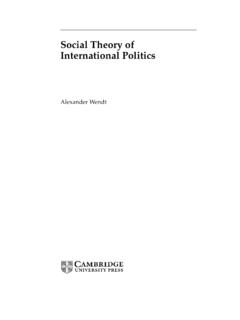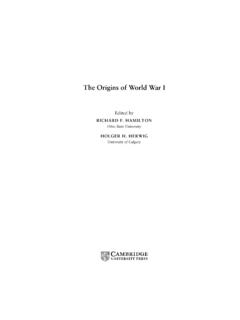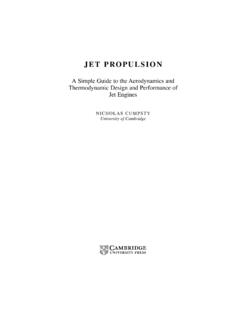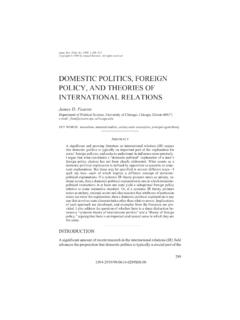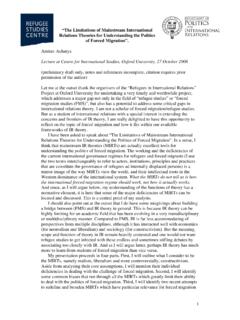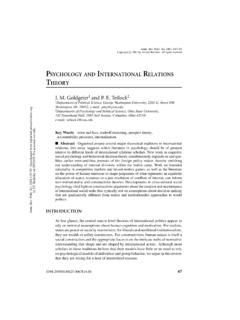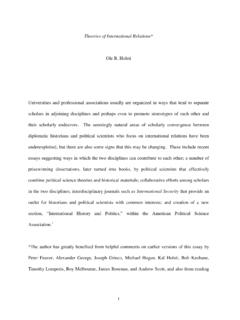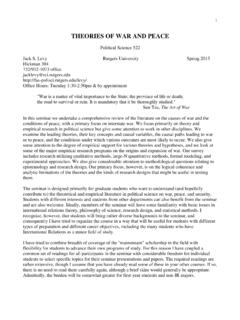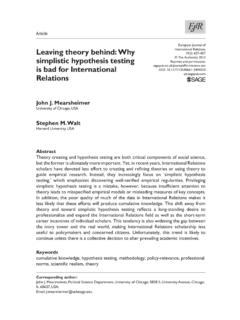Transcription of Normative Theory in International Relations A …
1 Normative Theory inInternational RelationsA Pragmatic ApproachMolly Cochranpublished by the press syndicate of the university of cambridgeThe Pitt Building, Trumpington Street, Cambridge, CB2 1RP United Kingdomcambridge university pressThe Edinburgh Building, Cambridge,cb2 2ru, 20th Street, New York,ny 10011 11, Road, Oakleigh, Melbourne3166, Australia#Molly Cochran1999 This book is in copyright. Subject to statutory exception and to the provisionsof relevant collective licensing agreements, no reproduction of any part maytake place without the written permission of Cambridge University published1999 Printed in the United Kingdom at the University Press, CambridgeTypeset in10/12pt Palatino [ce]A catalogue record for this book is available from the British Libraryisbn 0 521 63050 9hardbackisbn 0 521 63965 4paperbackContentsAcknowledgementspagexi AbbreviationsxivPrefacexvIntroduction1 Part I: Evaluating the impasse1 Cosmopolitanism: Rawlsian approaches to international21distributive justice2 Communitarianism.
2 Michael Walzer and international52justice3 Beyond the impasse? Hegelian method in the78cosmopolitanism of Andrew Linklater and thecommunitarianism of Mervyn FrostPart II: Confronting the impasse4 Poststructuralist antifoundationalism, ethics, and121normative IR theory5 Neo-pragmatist antifoundationalism, ethics, and144normative IR theoryixPart III: International ethics as pragmatic critique6 International ethics as pragmatic critique: a pragmatic173synthesis of the work of John Dewey and Richard Rorty7 Facilitating moral inclusion: feminism and pragmatic212critique8 From moral imagination to International public spheres:246the political and institutional implications of pragmaticcritiqueConclusion273 References281 Index292 Contentsx1 Cosmopolitanism: Rawlsianapproaches to internationaldistributive justiceIntroductionCosmopolitans seek to interrogate and complicate the value conferredupon sovereign states in the contemporary International system, sincecosmopolitans take individuals, not states, to be the starting point formoral consideration.
3 They question the way in which boundaries ofstate authority serve as the boundaries of obligation owed amongindividuals in International practice. For example, cosmopolitanswould challenge the claim of a particular state that the poor in themoral void outside its boundaries are not its responsibility. They donot accept that, at best, these poor can only hope to be the bene ciariesof charitable aid that ows across boundaries. For cosmopolitans,what is at issue here is the possibility of justice in an internationalsystem of cosmopolitans, to think about justice requires that we look pastprivileged practices and institutions, relinquish the power invested inthese social constructions, and consider the simple question of whatkind of Relations between individuals can be said to be reasonable orfair.
4 Accordingly, the question that considerations of justice raise forinternational practice is whether states represent a privileged powerpractice and whether they, like individuals, should be the subject of aninquiry into justice. In exploring this line of inquiry, I will concentrateupon cosmopolitan approaches which follow out of the work of choosing this focus, I do not intend to suggest that allconceptions of justice among cosmopolitans are to be identi ed witha Rawlsian approach. Clearly, one can point to cosmopolitan21approaches of a non-Rawlsian , I choose toconcentrate on this perspective as it has been the most in uentialconception of justice in de ning the cosmopolitan position in con-temporary Normative IR Theory .
5 Much of this in uence can be attrib-uted to the considerable extent to which the framework of thecosmopolitan/communitarian debate derives from contemporaryjustice debates in political Theory between liberals and communitar-ians: a debate stimulated by the work of Rawls. Within IR, CharlesBeitz (1979) is the writer generally attributed with the rst signi cantcontemporary attempt to tackle a cosmopolitan Theory for derivingprinciples of International justice in which he adapts Rawls's domesticformula for establishing principles of to thewritings of Beitz, Thomas Pogge (1989) has also drawn upon Rawls'swork in order to internationalize questions of distributive justice.
6 Thischapter aims to critically examine the work of Beitz and Pogge in lightof the progression in Rawls's own work on justice in order to assessthe cosmopolitan position as it stands within Normative IR Theory andthe possibilities for accommodation in the cosmopolitan/communi-tarian debate. Interestingly, of all the writers discussed in this book,Beitz and Pogge are closer than any others to being archetypical of theposition they represent, and it is only through tracing the develop-ments within Rawls's work that possibilities for narrowing the polesof debate might be Theory of Justice(TJ), Rawls (1971) begins with the problem ofhow we can develop procedures to arrive at fair principles of justicethat can be agreed to by point to a fundamental problem inhis formulation.
7 The assumptions upon which these procedures arederived are not universal (as Rawls suggests), but instead, areparticular to Rawlsian liberalism. Since 1971, Rawls has writtennumerous articles, recently revised and collected inPolitical Liberalism1 For a non-Rawlsian, Kantian conception of cosmopolitan justice see O'Neill (1986),(1990), and (1994). Barry (1989) is another cosmopolitan who takes a non-Rawlsianroute to International justice, which instead, draws from Thomas not a developed study of International distributive justice, Danielson (1973)offers an earlier critique of Rawls for failing to extend the redistributive principlebeyond domestic is important to note here that Rawls is not concerned with the question of whetherconsiderations of justice apply to states.
8 His aim is to develop a Theory of justice forindividuals within the con nes of domestic the impasse(Rawls 1993b).4In his later work, Rawls redirects emphases, and inthe opinion not only of his critics, but those sympathetic to his earlierwork as well, signi cantly alters his Theory of justice. The rst sectionbegins by looking brie y at the early Rawls ofTJand then turns to anaccount of Beitz's efforts to construct a Theory of International dis-tributive justice. In the second section, I argue that it is important toexplore the movement of Rawls's work since 1971 as this movement isre ected in the studies of International distributive justice by Beitzand Pogge.
9 I use Chandran Kukathas and Philip Pettit's outline of twostages in Rawls's later work (Kukathas and Pettit 1990: chapter 7): rst, to characterize Beitz's retreat from his critics as a retreat similarto that of the Rawls of stage one, which leans upon more expresslyKantian lines; and secondly, to examine Pogge's interest in inter-national applications of Rawls's domestic conception of overlappingconsensus in the second stage of his work. In the third section, Iexamine the implications of the development in Rawls's thought andits re ection in the work of these International theorists for thecosmopolitan position and the debate in Normative IR Theory as awhole.
10 The extended exegesis of changes in Rawls's work and itsin uence on these writers makes the format of this chapter differentfrom others in part I of the book. However, this exceptional treatmentis warranted in order to indicate that while Beitz and Pogge are notspeci cally concerned to locate points of accommodation within thecosmopolitan/communitarian debate, the movement in Rawls'sthinking suggests the Rawls, Beitz and an International theoryof justiceWhat follows is a simple exposition of a complex and important is a thumbnail sketch of those points relevant to the concernsoutlined above: themes Beitz draws upon, and themes redirected inRawls's later writings that are picked up by Pogge.

